From November 29 to December 6, JICA President Akihiko Tanaka visited Thailand, Senegal, Great Britain and Belgium. In Thailand, his first stop, he held talks with Prime Minister Yingluck Shinawatra and cabinet members, and signed a cooperative framework document for the ASEAN University Network/Southeast Asia Engineering Education Development Network (AUN/SEED-Net) Project. Tanaka also toured an industrial zone affected by the flooding last year, before flying to Senegal, where he held talks with President Macky Sall, among others.
Upgrading the Cooperation in Higher Education
Japan advocates cooperation for sustainable and stable economic development in ASEAN countries, along with education in engineering to support and shoulder that development. JICA began the AUN/SEED-Net project in 2003 aiming to raise the capacity of the education and research at the top 19 engineering universities in the 10 ASEAN countries. The project is currently in its second phase.
On November 29, Tanaka held talks with Professor Tawil Paungma, president of the King Mongkut's Institute of Technology Ladkrabang, which has deep and long relations with Japan and JICA. As a top-level engineering university in Thailand, the King Mongkut's Institute of Technology Ladkrabang is a core member of the AUN/SEED-Net project. Paungma expressed his gratitude for more than 50 years of cooperation with the institute and for the AUN/SEED-Net project extended to the phase three. In response, Tanaka noted that the phase three would promote industry and university linkage as well.
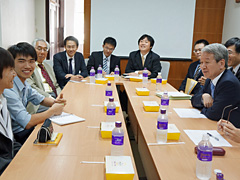
JICA President Akihiko Tanaka (right) discusses with master and doctor program students under the AUN/SEED-Net project at Chulalongkorn University in Bangkok
After the discussion, Tanaka attended the signing ceremony for the cooperative framework document (basic agreement) for the phase three of the AUN/SEED-Net project set to begin in March 2013. Before signing, Tanaka delivered a speech in which he touched the ever-rising needs to contribute to advancement of industry in the region, to address global issues shared by the region through collaborative research and to create a platform for promotion of science and technology in Asia, and expressed the hope that the phase three would advance all of these issues.

42 representatives including government ministries and universities in the partner countries simultaneously affix their signatures (Tanaka is third from the right in the front row)
Thailand for a more Matured Society
On November 30, Tanaka met with Prime Minister Yingluck Shinawatra. Impressed by the level of technology applied in the Kyushu Shinkansen (bullet train) that she observed in Japan, Yingluck expressed her interest in Japanese technology in relation to infrastructure for high-speed railway and surrounding area development in Thailand.
While agreeing the significance of these issues, Tanaka further explained the importance of appropriate cooperation for Thailand which has successfully achieved economic growth and is in the process of building a more matured society. Tanaka mentioned the AUN/SEED-Net contributing to advancement of industry through human resource development, and an elderly care project scheduled to begin in December 2012 as well. He also referred to the significance of Thailand-Japan joint assistance to third countries. Yingluck agreed to this.
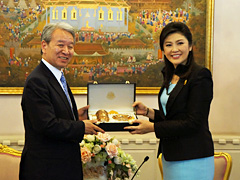
Prime Minister Yingluck Shinawatra (right) expresses her gratitude for JICA’s flood assistance
Yingluck also talked about her wish for assistance from Japan in technology and research toward enhancing capacity of human resources in industry which could contribute to the promotion of Japanese companies in Thailand. Tanaka responded that these issues are covered by the AUN/SEED-Net phase three, and that he is looking forward to strengthening the industry-university linkage to meet the needs of industry.
Tanaka then visited Nava Nakorn Industrial Zone in Pathumthani Province, heavily damaged by flood in 2011, and observed a Japanese company and flood preventive measures including dykes surrounding the industrial zone. In the wake of the flood, JICA assisted with flood management measures such as flood gates in Ayutthaya and development of a flood forecasting system.
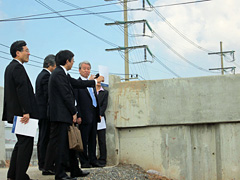
Tanaka (fourth from left) tours a dyke in the Nava Nakorn Industrial Zone
To Senegal, a Key Player in West Africa
From December 1st to 3rd, Tanaka then visited Senegal in West Africa. Among the countries in sub-Saharan Africa (the region south of the Sahara) that gained independence in the 1960s, Senegal is considered to be one of the most stable countries. As one of JICA’s activity bases in West Africa, there are high expectations that Senegal takes a leadership role as a democratic nation amid the instability of West Africa.
Facing the Atlantic Ocean with a coastline stretching approximately 720 kilometers, Senegal has a thriving fishery industry. On December 2nd, Tanaka started his tour by visiting the Central Fish Market of Dakar, built in 1989 under Japanese Grant Aid. He then proceeded to Taïba Ndiaye, a rural community in Thiès Region near the capital of Dakar, observed water supply facilities constructed with Japanese cooperation. He also visited a local community to observe production and processing activities. In that afternoon, he visited the Regional Hospital of Thiès, and observed implementation of “5S”, a Japanese methodology sometimes translated as “sorting, set in order, systematic cleaning, standardizing, and sustaining” that is promoted by the hospital and supported by Japan Overseas Cooperation Volunteers. This methodology has become a foundation for Senegal to improve its health care services. Tanaka expressed his hope that it would spread throughout the country for further advancement of services.
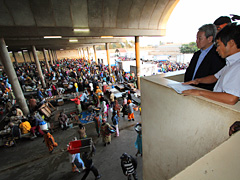
Tanaka (second from right) visits Central Fish Market of Dakar
Expectations for Japanese Expertise on Disaster Management for a Resilient Society
On December 3, Tanaka held talks with President Macky Sall. Sall expressed strong expectation for the cooperation on disaster management where Japan has expertise, since the Dakar region experienced unprecedented floods caused by torrential rains this summer. Also, from a perspective of food security, Sall expressed the need for assistance with cultivation of rice varieties such as New Rice for Africa, and the use of Japanese ODA loans for infrastructure development, including regional projects in Africa. Tanaka noted that it is important to keep Japanese cooperation in line with the national socio-economic development strategy formulated by the Sall administration in this November, and added “Food security is one of the key pillars of Japanese cooperation. We will also put our efforts to mobilize Japanese cooperation for private sector development and infrastructure development.” At the end of the discussion, Sall made a positive reply on his attendance to the TICAD V conference in Yokohama next June.
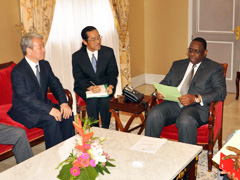
President Macky Sall (right) referred to the need for JICA’s assistance for flood management measures (photo courtesy of: Assane SOW/le soleil)
Tanaka also met with Prime Minister Abdoul Mbaye. Mbaye explained that he hopes that Japanese companies will expand their activities in Senegal, a gateway to West Africa. They further discussed issues on how to improve the business environment. Lastly, Mbaye expressed his appreciation for the Japanese assistance to training institutions, since the technical training implemented through such institutions as the Vocational and Technical Training Center (CFPT) and national health care and social development schools has greatly contributed to human resource development in West Africa.
Completing a visit in Senegal, Tanaka headed to his next destination, Europe.
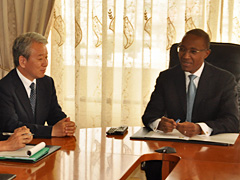
Prime Minister Abdoul Mbaye (right) expressed his wish that Japanese private sector will expand its business in Senegal (photo courtesy of Assane SOW/le soleil)
- The Southeast Asia Engineering Education Development Network (SEED-Net) Project




scroll